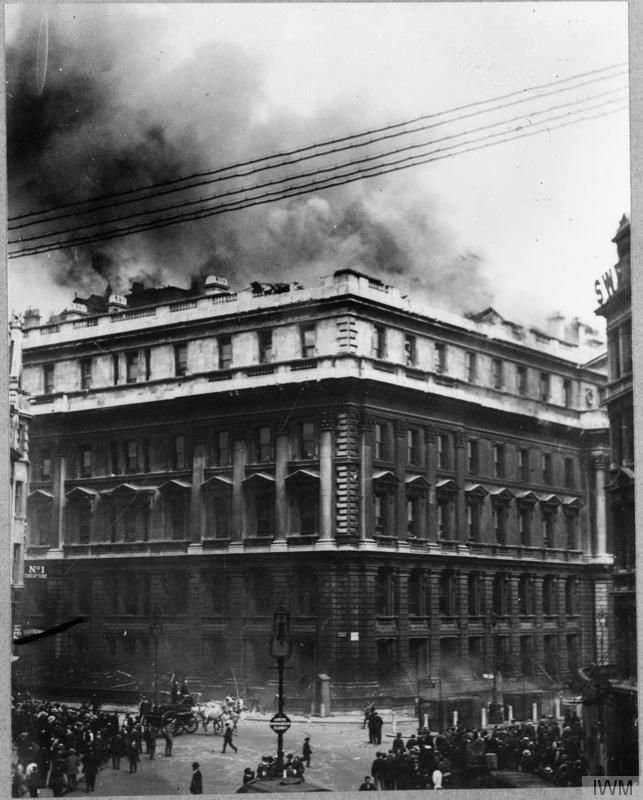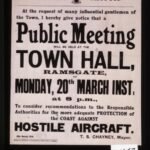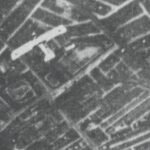
In my previous post, I discussed my concerns with the way sources are used in Neil Hanson’s First Blitz.1 Here I turn to the problem of strategy, which goes more to the argument of the book. Again there are two parts to this, one broad and one narrow. I’ll start with the broad.
Hanson’s argument is that Germany, across almost the entire duration of the war, hoped, planned and attempted to destroy London through bombing, specifically by burning it out:
Air-dropped incendiary bombs would create firestorms engulfing entire districts of London, creating mass panic and popular unrest that would ‘render it doubtful that the war can continue’ and force the British Government to sue for peace.2
In other words, Germany was attempting to carry out a knock-out blow from the air against Britain – in 1915 or 1918 rather than 1940.
I don’t have a problem with this idea as a general ambition; clearly there were great hopes invested in the possibilities of using strategic airpower against Britain, and the morale effect of bombing was key to this. My concern is with the specific assertion that the German intention was to create ‘firestorms’, which Hanson repeatedly calls the ‘Fire Plan’, or a couple of times in German ‘Der Feuerplan‘.2 Let’s set aside the question of whether anyone was thinking about causing a true firestorm (which was not a well-known phenomenon in 1914-18, and not something that was easy to make happen without careful planning; Bomber Command had to carry out a lot of research in order to cause the Hamburg firestorm in 1943).3 Certainly Germany would have been ecstatic to cause a really big fire in London, even if it was not actually a literal firestorm.
More importantly, by continually using the very formal-sounding ‘Fire Plan’, Hanson makes it seem like there was a consistent aim on the part of the German high command throughout the whole war to destroy London by fire.4 But as he himself shows very well, the German attempt to burn London was far from consistent, with intermittent effort, little planning, no research (apart from references to the Great Fire of 1897), and no effective incendiaries until the last year of the war, which in any case were never used against London (though they may have been used on Paris, though the evidence seems very thin).5 Despite this, the conclusion of First Blitz includes this absurdly grim vision:
Had London and Paris been engulfed by flames, the outcome of the First World War might have been different. What is certain is that tens of thousands, or even hundreds of thousands of innocent people in those two capitals – and in Berlin and other German cities when the inevitable reprisals followed – would have died in one final holocaust of the most blood-soaked war in human history.6
This is ridiculous. There is no possibility that the tiny German bomber force of 1918 could have achieved what the much bigger German air force of 1940 could not. This is where seductive talk of First Blitzes and Fire Plans gets you.
Moving on. The narrow ‘strategy’ issue I have with First Blitz relates to the above quote. Hanson describes what was in effect a suicide operation planned for August and September 1918, a last-ditch effort to enact the so-called Fire Plan through ‘waves of incendiary attacks on London and Paris’ (though why the supposedly single-minded focus on London had now expanded is not clear) ‘over and over again, until every single aircraft had been shot down or the surviving air-crews had become too exhausted to fly’.7
Bogohl 3, the England Squadron, would carry out a massive fire-raid on London, aiming to ‘engulf the capital in flames, the like of which had not been seen since the Great Fire of London some 250 years earlier.’ Simultaneously three other squadrons – Bogohls 1, 2 and 4 – would bomb Paris, ‘the nerve centre and main resistance of the Entente’.8
This operation was twice cancelled and then called off on 23 September, at the very last minute, on Ludendorff’s orders.9
My issue here is not that I don’t believe that something like this happened. To be honest, when I first read his account I did doubt it severely, but in the course of writing this post I’ve come to accept that it probably did (almost) happen. Hanson cites several German primary or interwar sources, including, most importantly, the diary of Wilhem Siegert, the Luftstreitkräfte‘s inspector of aerial troops and ‘the father of the Fire Plan’;10 the postwar memoirs of Walter Aschoff (an observer with Bogohl 3), Ludendorff and Hindenburg; interwar accounts by Hilmer von Bülow and Ernst von Höppner; and a 1943 history of German airpower by ‘Hauptmann Hermann’ (Hermann Steiner).
The problem is that I don’t feel I can trust the way Hanson uses these sources. As I’ve already discussed, this is too often cavalier. Here, he has what look like some great sources, especially Siegert and Aschoff, but he nearly always opts to merely quote them, sometimes at length, without any analysis or comparison, and with little or no context from secondary sources. Others look more problematic. ‘Hauptmann Hermann’ was a German writing in the US in 1943, while Bülow was a German writing during the Nazi period; do we simply take their accounts at face value? Hanson doesn’t say; everything is just thrown into the mix. (To be fair, the official German archives relating to the Luftstreitkräfte were destroyed by Allied air raids in the next war, so these are the sorts of sources historians of the German side of the Gotha raids have to work with.)
Take the block quote above as another example. Hanson quotes two other sources in those two sentences, which a non-pedantic reader (i.e. nearly everyone!) might assume are primary sources backing up his claims. But checking the endnotes shows that the first is from a 1982 history of the raids by H. G. Castle, Fire Over England, which does allude to the planned fire raids, but in a very general way.11 And the second is to Bülow’s Geschichte der Luftwaffe, a history published in the Third Reich; obviously care is needed in using such a source.12 Maybe Bülow is a good source; certainly Castle is not adding much in the way of evidentiary weight.
I haven’t been able to check most of Hanson’s other sources here, which in any case are mostly German-language, which I can’t read. A couple I can access, though. He cites Hindenburg as reflecting ‘German optimism about the impact the fire-raids would have on Paris’ when he quotes him as writing that ‘the political atmosphere seemed to be heavily charged […] we had reason to hope there would be an explosion’, but Hindenburg was clearly referring to the spring offensive in March 1918, not air raids in August-September.13 So that’s not inspiring confidence. Ludendorff is much more useful. He says:
Our position was now so serious that General Headquarters could not hope that air-raids on London and Paris would force the enemy to make peace. Permission was therefore refused for the use of a particularly effective incendiary bomb, expressly designed for attacks on the two capitals, of which sufficient supplies were ready in August.14
This does seem to confirm that there was a plan to use the Elektron on both London and Paris, with hopes that the raids would end the war in (or at least more in) Germany’s favour. This is a dramatic and really fascinating claim, which does appear in other secondary sources – Hanson certainly didn’t invent the story. For example, the most generally reliable account of the Gotha raids, Raymond Fredette’s The Sky on Fire, says this:
Devastating fire raids were planned late that summer [1918]. The England Squadron was to assault London, while three other Geschwadern were to fly to Paris on the same night. The bombers were to return the following day, that night, and continue to do so until all were shot down or their crews were too exhausted to take off.15
Fredette says much the same as Hanson about Ludendorff calling off the raids at the last minute, having recognised that they would only complicate armistice negotiations: ‘the message quashing the attack was received less than an hour before the Gothas were to set out for London’.16 But Fredette’s sources are not as extensive as Hanson’s – Ludendorff, Hermann, Bülow (albeit a pre-Nazi article, which Hanson does also cite) – and he provides even less analysis. There are very few other secondary sources discussing the aborted raids, and none that I’ve found that are as detailed as Fredette, much less Hanson. First Blitz, for all its faults, is the best account we have.
This has grown into a long and somewhat tangled post. Let’s step back a bit – what is it that I’m trying to say?
I think that First Blitz is a brave attempt to tell an important part of the history of the Great War and of airpower which should be more widely known, but also that it’s a flawed one, due to the way Hanson uses his sources and exaggerates the consistency of German strategy. And I realise I’m being unfair here: he’s writing popular history, not academic history, so I can’t expect him to cross every t and dot every i.
But that Germany planned a last-ditch, abortive attempt to knock-out blow London and Paris in the summer of 1918 is, I think, actually quite important, and deserves to be more widely known. For one thing, it affirms that the apocalyptic visions of aerial destruction that coalesced in the latter stages of the First World War were not confined to Britain, or even to a few airpower prophets in Italy, America, or elsewhere. It also suggests an alternative narrative to the standard anglocentric one of the Gotha raids in 1917 initiating the formation of the RAF in 1918, with a brief (in theory) to carry raids into Germany while the Zeppelin and Gotha attacks on Britain tapered away. A European bombing war really was brewing by 1918 and it should be seen in the round, rather than as isolated stories. Finally, by the end of the war strategic bombing was more than a sideshow for Germany’s leaders; they believed, or at least hoped, that it was a powerful weapon which played a part in their strategic calculations. But I can’t find anything extensive in any other works I have to hand on either First World War airpower, German strategy, 1918, etc. Admittedly my search was not exhaustive, but a last-ditch German effort to win the war by bombing London and Paris should surely factor into these accounts somewhere.
So, in the end, I while I think Hanson over-eggs the pudding by habitually referring to a ‘Fire Plan’, I do think he is onto something in taking the German air raids as a serious attempt to win the war, both generally and with reference to the planned 1918 raids. And he should be applauded for that. I would still like to see a detailed, forensic account of the German air raids on Britain from the German side. It’s not a book I can write, so if anyone knows of an existing one, I’d be very grateful to read it! In the meantime, in June I’ll be at the National Archives and hopefully will get a chance to look at translated versions of Höppner and Bülow for myself – which, by the way, I know only because Hanson cites them!17 There’s more to be said on this topic!
Image source: Imperial War Museum Q 65535.
![]() This work is licensed under a Creative Commons Attribution-NonCommercial-NoDerivatives 4.0 International License.
Permissions beyond the scope of this license may be available at http://airminded.org/copyright/.
This work is licensed under a Creative Commons Attribution-NonCommercial-NoDerivatives 4.0 International License.
Permissions beyond the scope of this license may be available at http://airminded.org/copyright/.
- Neil Hanson, First Blitz: The Secret German Plan to Raze London to the Ground in 1918 (London: Doubleday, 2008). [↩]
- Ibid., 7. [↩] [↩]
- Richard Overy, The Bombing War: Europe 1939-1945 (London: Allen Lane, 2013), 328–329. [↩]
- I’ve found no evidence of the term ‘Feuerplan‘ in this context before Hanson himself used it, even though there is now a whole German-language Wikipedia page with that title, based of course on First Blitz. [↩]
- Hanson, First Blitz, 341–344. [↩]
- Ibid., 344. [↩]
- Ibid., 313. [↩]
- Ibid., 312. [↩]
- Ibid., 330. [↩]
- Ibid., 332. [↩]
- H. G. Castle, Fire Over England: The German Air Raids of World War I (London: Secker & Warburg, 1982), 223. [↩]
- Hanson lists two books with that title in the bibliography, from 1934 and 1937, presumably different editions. Göring wrote the foreword to the latter! [↩]
- Hanson, First Blitz, 312; cf. Paul von Hindenburg, Out of My Life, trans. F. A. Holt (London: Cassell, 1920), 358. [↩]
- Erich von Ludendorff, Ludendorff’s Own Story, August 1914-November 1918, vol. 2 (New York: Harper & Brothers, 1919), 351. Note that Hanson actually cites the German edition: Erich Ludendorff, Meine Kriegserinnerungen, 1914-1918 (Berlin: Ernst Siegfried Mittler und Sohn, 1920), 565, which seems to be substantially the same account, as far as I can tell. [↩]
- Raymond H. Fredette, The Sky on Fire: The First Battle of Britain 1917–1918 and the Birth of the Royal Air Force (Washington, D.C.: Smithsonian Institution Press, 1991), 172. [↩]
- Ibid., 172. [↩]
- TNA AIR 1/2126/207/79/23, AIR 1/2126/207/79/48. [↩]




First off, thanks for continuing to guide me towards more books to read.
Secondly, having read most of First Blitz, I have two major problems with it. I agree with you that there is enough evidence out there to suggest a planned German firebombing offensive late in the war and that it was.called off. However I disagree with the potential result of the ‘suicide raid’ as described in the book. As a popular history I can see a ‘sexing-up’ of the tale, but when looking at numbers of bombers and the lack of concentration of effort (in time and space) there is no way that London would have been the subject of a firestorm. Simply looking at the conditions on the ground at London compared with Hamburg, Darmstadt, Dresden, and Tokyo it doesn’t even begin to add up. The comments you make about Berlin are extremely pertinent to possible results of a London fire raid, even with the Elektron incendiary (the touting of which does again seems a bit inflated.
The biggest issue I have with the book though is with the lack of explanation about a theoretical basis behind the war-long German wish to burn out London. I’m not so well read of very early strategic bombing theory, but to have the doctrine you need a theoretical idea behind it, and I’m not seeing any evidence in First Blitz to suggest this. When were the first theoretical strategic bombing ideas published? Was there enough time between then and the start of World War German bombing over England? The first German military airships were bought in 1908 IIRC. Was there a basis for an operational doctrine at that point? If not, when between 1908 and 1915 did it occour, and if nowhere then the argument that the Germans had always planned a ‘knock-out blow’ or ‘Feurplan’ becomes untenable.
Much enjoying your blog as always. Keep it going please.
It’s a long time since I read this book but I don’t remember it making anything like a convincing case for a 1918 firestorm. The Gothas and Giants were repeatedly thwarted by the weather (just strong headwinds could prevent them from crossing the Channel) and the Elektron wouldn’t have changed that. The raid maps in Ian Castle’s “London 1917–18” (Osprey, 2010) don’t suggest that the necessary concentrated bombing was an objective, let alone achieved. Nor did Hanson consider possible countermeasures to magnesium incendiaries — I’m pretty sure they had buckets of sand in 1918 just as they did in 1940 — and would repeated fire- bombing not have engendered a proto-ARP of some kind, whether official or through voluntary initiative?
Thanks for your perceptive comments, in the face of my lack of timely responses on my own blog!
Rick:
There were theories of strategic bombing available at the time. In Britain before 1914 the prevailing idea was the ‘nerve centre’ theory, which held that you could paralyse a city (and perhaps a nation) by precision bombing of things like telephone exchanges, power stations, railway stations, stock exchanges, etc. Obviously no possibility of that with the actual technology. The knock-out blow theory, in the sense of a massive, overwhelming onslaught which would destroy civilian morale and lead to demands for peace, if not revolution, was also around in embryonic form, and while I’m not an expert on the German side of things, this seems to have been the popular hope, if not actual belief. That seems to have been what underlay the Fire Plan. If you think about Russia being knocked out by revolution the previous year, and the concurrent attempts to starve out Britain by U-boats, and the fact that by 1918 everybody except the Americans is just so bloody tired of the war, it’s not such a crazy idea. But of course, thinking and doing are very different things…
Nick:
Yes, all good points! And proto-ARPs did indeed evolve in WWI, as early as 1915 (Hull) – in fact I’m giving a talk on aspects of this next year in Auckland!